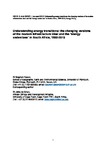Understanding energy transitions: the changing versions of the modern infrastructure ideal and the ‘energy underclass’ in South Africa, 1860-2019
| dc.contributor.author | ESSEX, Stephen | |
| dc.contributor.author | De Groot, J | |
| dc.date.accessioned | 2019-08-20T11:19:59Z | |
| dc.date.issued | 2019-08-20 | |
| dc.identifier.issn | 0301-4215 | |
| dc.identifier.other | 110937 | |
| dc.identifier.uri | http://hdl.handle.net/10026.1/14806 | |
| dc.description.abstract |
There is increasing recognition that the prospects of a post-networked city challenges the myth of the modernist ideal of a networked city and offers a more realistic proposition for energy transitions in the global south. This paper examines the energy transitions involved in the development of South Africa’s versions of the modern infrastructural ideal for electricity provision since the nineteenth century. Four phases of South Africa’s energy transition are identified, consisting of colonial, apartheid, post-apartheid and low-carbon phases. The paper argues that the agendas influencing the generation, distribution and consumption of electricity in South Africa are multiple and potentially conflicting, which are emblematic of the limitations of the modern infrastructure ideal, particularly in relation to the formation of an ‘energy underclass’. Recognition and consideration of the potential uneven and differentiated spatial effects of energy transitions will continue to be integral to the planning and management of any transformations towards a post-networked city. | |
| dc.format.extent | 110937-110937 | |
| dc.language | en | |
| dc.language.iso | en | |
| dc.publisher | Elsevier | |
| dc.rights | Attribution-NoDerivatives 4.0 International | |
| dc.rights | Attribution-NoDerivatives 4.0 International | |
| dc.rights | Attribution-NoDerivatives 4.0 International | |
| dc.rights | Attribution-NoDerivatives 4.0 International | |
| dc.rights | Attribution-NoDerivatives 4.0 International | |
| dc.rights | Attribution-NoDerivatives 4.0 International | |
| dc.rights.uri | http://creativecommons.org/licenses/by-nd/4.0/ | |
| dc.rights.uri | http://creativecommons.org/licenses/by-nd/4.0/ | |
| dc.rights.uri | http://creativecommons.org/licenses/by-nd/4.0/ | |
| dc.rights.uri | http://creativecommons.org/licenses/by-nd/4.0/ | |
| dc.rights.uri | http://creativecommons.org/licenses/by-nd/4.0/ | |
| dc.rights.uri | http://creativecommons.org/licenses/by-nd/4.0/ | |
| dc.title | Understanding energy transitions: the changing versions of the modern infrastructure ideal and the ‘energy underclass’ in South Africa, 1860-2019 | |
| dc.type | journal-article | |
| plymouth.volume | 133 | |
| plymouth.publication-status | Published | |
| plymouth.journal | Energy Policy | |
| dc.identifier.doi | 10.1016/j.enpol.2019.110937 | |
| plymouth.organisational-group | /Plymouth | |
| plymouth.organisational-group | /Plymouth/Faculty of Science and Engineering | |
| plymouth.organisational-group | /Plymouth/REF 2021 Researchers by UoA | |
| plymouth.organisational-group | /Plymouth/REF 2021 Researchers by UoA/UoA14 Geography and Environmental Studies | |
| plymouth.organisational-group | /Plymouth/Research Groups | |
| plymouth.organisational-group | /Plymouth/Research Groups/Centre for Research in Environment and Society (CeRES) | |
| plymouth.organisational-group | /Plymouth/Research Groups/Centre for Research in Environment and Society (CeRES)/CeRES (Reporting) | |
| plymouth.organisational-group | /Plymouth/Research Groups/Marine Institute | |
| plymouth.organisational-group | /Plymouth/Users by role | |
| plymouth.organisational-group | /Plymouth/Users by role/Academics | |
| dcterms.dateAccepted | 2019-08-11 | |
| dc.rights.embargodate | 2020-8-19 | |
| dc.rights.embargoperiod | Not known | |
| rioxxterms.version | Accepted Manuscript | |
| rioxxterms.versionofrecord | 10.1016/j.enpol.2019.110937 | |
| rioxxterms.licenseref.uri | http://creativecommons.org/licenses/by-nd/4.0/ | |
| rioxxterms.licenseref.startdate | 2019-08-20 | |
| rioxxterms.type | Journal Article/Review |



